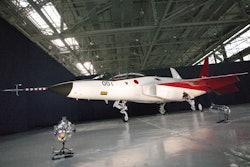China is making substantial investments in unmanned aerial vehicles, but experts cautioned that the rapidly growing Chinese drone industry could have major national security ramifications.
The Associated Press recently profiled TT Aviation Technology Co. in Beijing, one of more than 40 institutes teaching students how to operate drones.
The students — primarily young men — learn drone regulations and fly the aircraft both in simulators and in the field before earning the country's operator's license.
China, the world's largest drone manufacturer, is expected to need more than 10,000 drone pilots operating in a variety of industries this year, but TT officials told the AP that only about 1,000 people currently hold licenses.
Most of TT Aviation's drones are used in agriculture, but Chinese drones are also used to develop urban infrastructure and assist law enforcement. Some are capable of remotely firing tear gas or even bombs.
That's prompted worries among foreign policy experts, who told Voice of America that investments in drone technology by China or Russia could open new and uncertain markets to advanced UAVs.
Although U.S. policy currently bans exports of armed drones, Chinese drone exports could eventually find their way into Middle East, Africa or South America. VOA noted that Chinese-made drones are already involved in attacks against the Islamic State group in Iraq and are flying in disputed areas of North Korea, Pakistan and Syria.
In addition, drones could one day be used by China to monitor its interests in volatile areas throughout Asia and Africa, and could inflame long-simmering territorial disputes between China and its neighbors.
"The area over the disputed islands in the South China Sea and the East China Sea is increasingly a prime area for drone competition," Michael Boyle of the Philadelphia-based Foreign Policy Research Institute told VOA.
Fast-Growing Chinese Drone Industry Sparks Security Concerns
China is making substantial investments in unmanned aerial vehicles, but experts cautioned that the rapidly growing Chinese drone industry could have major national security ramifications.
Feb 10, 2016
Latest in Industry 4.0






















